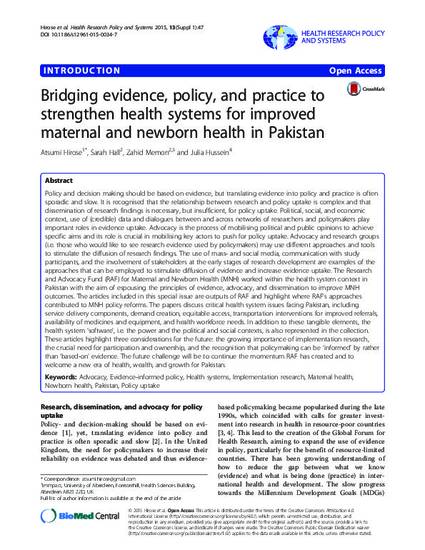
Policy and decision making should be based on evidence, but translating evidence into policy and practice is often sporadic and slow. It is recognised that the relationship between research and policy uptake is complex and that dissemination of research findings is necessary, but insufficient, for policy uptake. Political, social, and economic context, use of (credible) data and dialogues between and across networks of researchers and policymakers play important roles in evidence uptake. Advocacy is the process of mobilising political and public opinions to achieve specific aims and its role is crucial in mobilising key actors to push for policy uptake. Advocacy and research groups (i.e. those who would like to see research evidence used by policymakers) may use different approaches and tools to stimulate the diffusion of research findings. The use of mass- and social media, communication with study participants, and the involvement of stakeholders at the early stages of research development are examples of the approaches that can be employed to stimulate diffusion of evidence and increase evidence uptake. The Research and Advocacy Fund (RAF) for Maternal and Newborn Health (MNH) worked within the health system context in Pakistan with the aim of espousing the principles of evidence, advocacy, and dissemination to improve MNH outcomes. The articles included in this special issue are outputs of RAF and highlight where RAF’s approaches contributed to MNH policy reforms. The papers discuss critical health system issues facing Pakistan, including service delivery components, demand creation, equitable access, transportation interventions for improved referrals, availability of medicines and equipment, and health workforce needs. In addition to these tangible elements, the health system ‘software’, i.e. the power and the political and social contexts, is also represented in the collection. These articles highlight three considerations for the future: the growing importance of implementation research, the crucial need for participation and ownership, and the recognition that policymaking can be ‘informed’ by rather than ‘based-on’ evidence. The future challenge will be to continue the momentum RAF has created and to welcome a new era of health, wealth, and growth for Pakistan.
Available at: http://works.bepress.com/zahid_memon/6/
